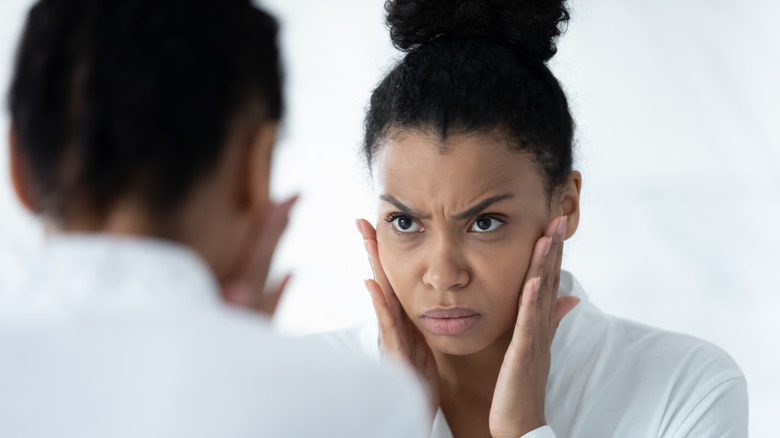How PCOS Can Affect Your Skin
Polycystic ovary syndrome, also known as PCOS, is a disorder that enlarges the ovaries and causes a host of other problems. Around 10% of women of childbearing age have the condition (via Healthline). Scientists believe it is caused by hormone imbalances, but the exact cause is not known (via Harvard Health). While one of the main medical effects of PCOS is loss of fertility, other issues related to hormones can make PCOS a physically painful condition. And some of the most common issues caused by PCOS are related to the skin.
Symptoms of PCOS can vary widely. Women with PCOS may exhibit a number of symptoms depending on their unique hormonal makeup. Skin issues such as hormonal acne tend to be more noticeable and therefore a catalyst for women to see a doctor and get a PCOS diagnosis. When PCOS causes estrogen and progesterone levels to go down, testosterone levels rise (per Healthline). This can trigger acne along the jawline, chin, and neck. Cystic acne is commonly seen in PCOS patients. Menstruation can also exacerbate these flares as hormone levels shift.
There's no cure for PCOS, but there are treatments
Excessive hair growth in places that normally do not have much hair can be a sign of PCOS (via Harvard Health). Places that this hair growth can commonly be seen are the chest, back, neck, and chin. Just like PCOS-related acne, this condition is caused by high levels of testosterone. Some women also have dry, flaky skin as a result of their PCOS (via Verywell Health). A less common symptom of PCOS is a skin condition known as acanthosis nigricans, where patches of dark skin show up around the underarms and neck. This may be caused by an overgrowth of skin cells.
Currently, there is no known cure for PCOS. There are, however, treatment options for the skin issues that come as a result of the syndrome. Medications that help with hormonal regularity or insulin resistance may be helpful in controlling the symptoms of PCOS. Maintaining a healthy skin care routine can also help lessen signs of acne and inflammation of the skin. And because not every person will exhibit the same symptoms, it's best to work with a medical professional to tailor a treatment plan for PCOS.

